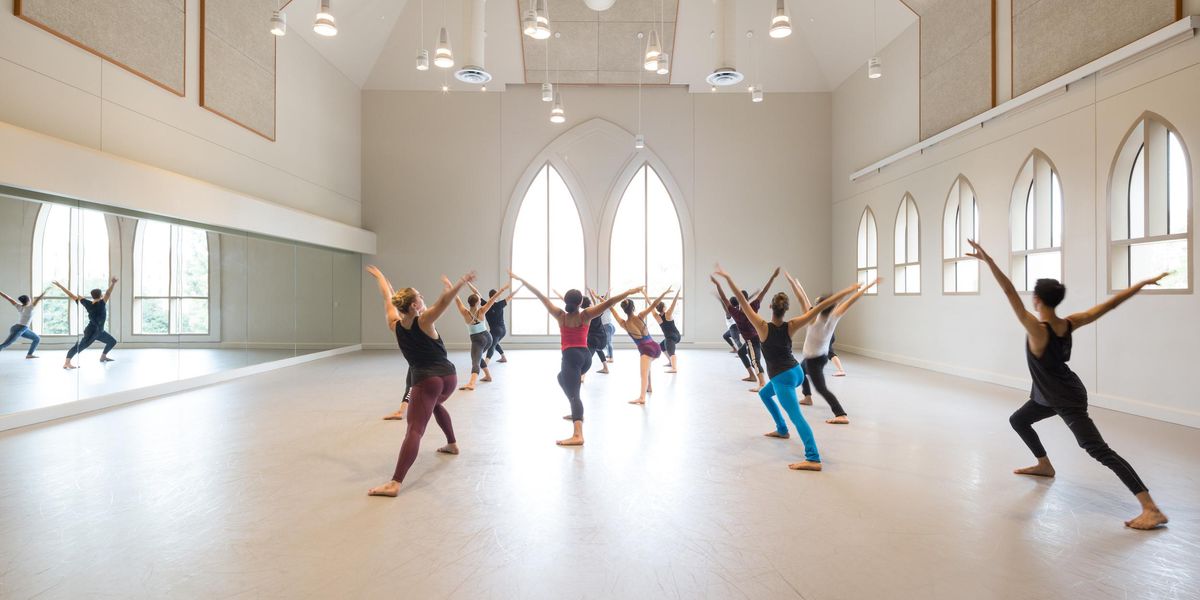Quick Q&A: Monica Bill Barnes
The choreographer isn’t always trying to make you laugh—but you probably will.
This month the Joyce Theater presents a new series of shared concerts called FOCUS Dance (see “
New York Notebook”). One of the eight choreographers is Monica Bill Barnes, known for her funny, irreverent works, who performs Jan. 5 and 7. Her hilarious signature piece Another Parade, in which white girls riff on the James Brown song “Sex Machine,” actually started as a joke, but a friend convinced her to show it in public. Her company of four women, Monica Bill Barnes & Company, has performed across the U.S. and abroad. She’s also choreographed for other groups, including the Juilliard School and Parsons Dance. A graduate of NYU’s Tisch School of the Arts, Barnes spoke with Wendy Perron in a coffee shop last fall.
As a choreographer, did you start with solos?
It was an economic necessity. For five to seven years I did about a solo a year. And I toured a lot—sleeping-on-people’s-couches kind of touring.
What were your music choices?
I was all over the map. I had a Schubert piece. Opera. I had klezmer music. Janis Joplin. Tina Turner and Ike Turner had one number that I really loved. I wanted to use recorded sound so that the audience had familiarity with it.
Because then you could play with their expectations? I’m still trying to sort that out. I like having the music in the studio for a really long time so that I can get past my first and second and third impulses to it. Yeah, I think the expectation that you can go with or against is theatrically useful.
When you were in training, which choreographers did you admire? Ann Carlson came and set a piece when I was at NYU, and it changed the way I thought about being a performer. At the same time, Doug Varone was making a work on us—I’ve never seen somebody put out movement quicker. I’ve always been a huge admirer of Trisha Brown, although I’m a disaster at that movement style. Another person was Bill Irwin. There’s something about the way that he brings audiences to him that I’m just inspired by.
Where do you fall in the balance between entertainment and art? If the work is entertaining, I’m not upset by that. I don’t feel a responsibility to have the work be alienating and hope that that means it’s better. My work is dealing in that everyman category, where you 8 8 want people to have some sense of empathy and familiarity.
How do you approach humor in your work? Oftentimes I’m not intending to be humorous, and the most tragic moments are where the biggest laughs come. I made a solo for Anna Bass where boxes get thrown at her and she has to relocate them while still dancing. In rehearsal it was really heartbreaking, and in performance it gets a huge laugh.
Tell me about your piece for FOCUS.
It’s a two-part piece. Mostly Fanfare is the first part, and the second is Everything Is Getting Better All the Time. We’re now touring this work so I feel like we’re understanding it as performers better. So often with New York premieres, the work hasn’t matured as a performance piece.
How do you feel about sharing a program with Joe Goode? I grew up in the Bay Area, so for me this is a dream come true. He once said, in a composition class I took, that the most important thing is to decide what role the audience plays in your work. I don’t know that I’ve ever answered it spot on, but I ask myself that question every work.
Your movement is so fast. Where does that come from?
My father was a runner and I used to run with him. It’s hard for me to slow down. I had a comp teacher once say to me, “You’ve got to work on moving slow. You’re going to hurt my eyes.” I think it also has something to do with the urgency of making the most of every minute onstage.
What do you have lined up after the Joyce?
We have a show at Joe’s Pub in February. I love that space. Anna and I have been collecting ideas that don’t make sense for a larger stage but are ideas I love, so I’ll really be able to delve back into some of those.
What’s your advice for young dancers who’d like to be choreographers?
It is a challenging time to be in the arts, but there are so many creative ways to make a life in this field. The mold of having a company has been split apart, and I feel like there’s potential to create the company or structure or lifestyle that best suits the kind of work you want to do. Right now it’s an exciting time to be a performer because of that potential.
From top: Monica Bill Barnes. Photo by Kristi Pitsch, Courtesy Jacob’s Pillow;
Everything Is Getting Better All the Time. Photo by Christopher Duggan, Courtesy Bill Barnes.




